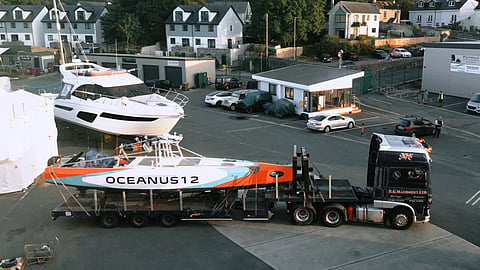UK-built USV participates in NATO autonomous systems exercise off Portugal
UK unmanned systems manufacturer Zero USV has deployed one of its unmanned surface vehicles (USVs) to Troia, Portugal, joining NATO's largest exercise for autonomous naval systems alongside more than 20 allied nations and global defence partners.
The Plymouth-based firm has been competitively selected by the Royal Navy to send one of its 12-metre USVs to Robotic Experimentation and Prototyping using Maritime Uncrewed Systems Dynamic Messenger (REPMUS DYMS) 2025, a three-week exercise programme hosted by the Portuguese Navy off the Tróia Peninsula and Setúbal Bay.
Exercise REPMUS is a Portuguese-led proving ground for maritime autonomy integrated with NATO’s Exercise Dynamic Messenger (DYMS), where navies, defence contractors and technology providers test how uncrewed and crewed fleets can operate together in live missions.
The hybrid electric USV has been designed for extended duration, over-the-horizon autonomous operations. The fully autonomous AI-enabled vessels, each with a range of up to 2,500 nautical miles, are mission-agnostic but typically are used to integrate payloads such as hydrographic survey equipment and advanced surveillance and communications systems.
In preparation for REPMUS DYMS, the USV received a significant hardware and sensor upgrade package. One prominent addition is a custom automated winch, which has been loaded with a thin line towable acoustic array from Optics11.
Zero USV has also designed and built a prototype sonobuoy launch system to demonstrate the craft's capability to launch the Royal Navy’s acoustic sonobuoys. The USV will be tasked with deploying the sonobuoys at the start of the daily exercises in conjunction with those from a crewed support vessel.
A Teledyne extended range, deepwater multibeam sensor has been fitted to the gondola/keel and will be used to collect military bathymetric data, while a Navtech HD radar has been integrated into the software stack, increasing the situational awareness for even small objects at up to one kilometre away.
"Exercises like REPMUS_DYMS bring navies, researchers and industry together to test uncrewed technology in demanding missions," said Ian Danbury, lead planner for the underwater component of the exercises. "The involvement of companies such as Zero USV ensures NATO can see how emerging systems integrate with conventional fleets and where they can add real value."


